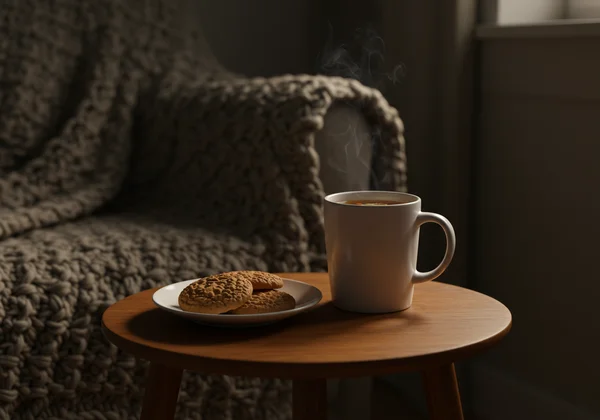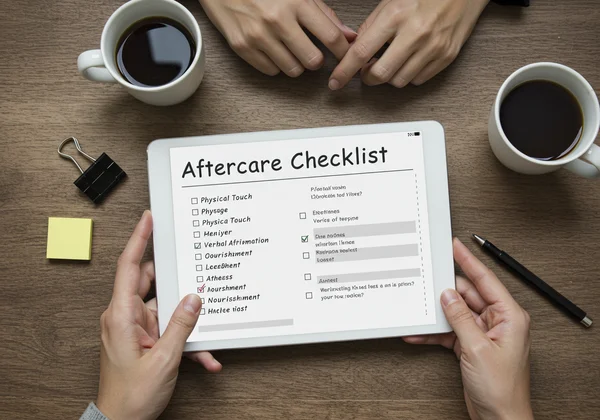BDSM Aftercare: A Crucial Guide for Your BDSM Role & Kink Test Results
August 17, 2025 | By Leo Martinez
Have you ever wondered what happens after a BDSM scene ends? The intensity, vulnerability, and rush of endorphins from exploring your kinks are powerful, but the moments that follow are just as crucial for building trust and ensuring emotional well-being. This is your guide to BDSM aftercare—the practice that transforms a powerful experience into a profoundly connecting one. Understanding it is fundamental, no matter your BDSM role, as it's the bedrock of trust and emotional safety.
The journey into your desires is deeply personal, and aftercare is the compassionate map that guides you and your partners back to a place of mutual respect and connection. It’s about tending to the mind, body, and spirit after they have been pushed to new limits. Before you can provide or ask for the right kind of care, you need to understand your own needs, which is why a confidential exploration can be so valuable. To start your journey of discovery, it helps to first grasp the pillars of safety.
What is BDSM Aftercare, and Why Is It So Important?
At its core, BDSM aftercare is the process of emotional and physical support given and received after a scene or power-exchange dynamic. It’s a dedicated time for participants to transition out of their roles and reconnect as individuals. This practice is not an optional extra; it is a fundamental component of healthy, ethical BDSM, as vital as negotiation and safewords. It's the emotional safety net that allows for brave exploration.

The importance of aftercare stems from the intense physiological and psychological states that BDSM can induce. Pushing boundaries, whether through pain, restraint, or psychological play, releases a potent cocktail of hormones like adrenaline and endorphins. When these levels drop, it can leave a person feeling vulnerable, confused, or even depressed. Aftercare is the proactive response to this biological reality.
The Psychology Behind the Need: Understanding Sub Drop and Dom Drop
One of the most critical reasons for aftercare is to mitigate or manage "drop." Sub drop is a term used to describe the emotional and psychological crash a submissive or bottom can experience after a scene. Symptoms can range from sadness, anxiety, and irritability to profound loneliness and self-doubt. This isn't a sign of a bad experience but a natural physiological response to the brain coming down from a significant high.
Less discussed but equally valid is Dom drop. Dominants, tops, and sadists can also experience a difficult emotional aftermath. After holding a position of power and responsibility, they might feel a sudden sense of guilt, emptiness, or anxiety about whether they performed their role correctly or went too far. This drop is often rooted in the weight of responsibility they carried during the scene.
More Than a Cuddle: How Aftercare Builds Trust and Consent
While cuddling can be a part of aftercare, the practice is much deeper. It is an active demonstration of trust and consent that extends beyond the scene itself. When partners engage in aftercare, they are non-verbally communicating: "I care for you as a whole person, not just for the role you play." This act reinforces that the dynamic was a consensual exchange between equals, strengthening the bond and making future exploration feel safer.
This process is where trust is truly forged. It shows that all participants are committed to each other's well-being, which is the bedrock of any healthy relationship, especially one involving kink. It's the ultimate expression of respect for the vulnerability shared. To better understand your own relational needs, you can discover your unique preferences with our tool.

Aftercare vs. After-Scene: Recognizing the Difference
It's helpful to distinguish between immediate after-scene care and long-term aftercare. After-scene care happens in the moments directly following play. This might include untying restraints, providing water, checking for marks, or wrapping someone in a warm blanket. It's the immediate, practical first aid.
Aftercare, however, can extend for hours or even days. It’s the continued emotional check-in, the conversation about the scene, and the reassurance needed to fully process the experience. Recognizing this difference ensures that care doesn’t stop once the scene is technically over.
Actionable Kink Aftercare Ideas for Every Role
The best aftercare is personalized. What one person finds comforting, another may not. This is why knowing your role and preferences is so vital. If you are still exploring your place in BDSM dynamics, taking a BDSM roles test can provide clarity and help you communicate your needs more effectively. Here are some ideas tailored to different roles.
Aftercare for Submissives, Bottoms, and Masochists
Those in a receiving role often need grounding and reassurance after surrendering control. Their aftercare may focus on feeling safe, cherished, and brought back to a state of equilibrium.
- Physical Comfort: Gentle, non-demanding touch like stroking hair, holding hands, or warm cuddles under a heavy blanket.
- Verbal Affirmation: Hearing words of praise like "You did so well," "You are so good," or "Thank you for trusting me."
- Nourishment: A warm, sweet drink like tea or hot chocolate, and a simple snack to help stabilize blood sugar.
- Quiet Connection: Simply lying together and listening to calming music can be incredibly healing.
Aftercare for Dominants, Tops, and Sadists
The person in the giving role needs aftercare to de-role and process the responsibility they held. Their care often revolves around reassurance and releasing the weight of their role.
- Words of Gratitude: Hearing "Thank you for that experience" or "I trust you completely" can alleviate feelings of Dom drop.
- Physical Connection: Receiving gentle touch or a massage can help them transition out of a headspace of control.
- Debriefing: Having a chance to talk about the scene from their perspective, sharing what they enjoyed and any concerns they had.
- Permission to Relax: Being explicitly told "Your responsibility is over now, you can relax" can be a powerful release.
Aftercare for Switches: Adapting Care to the Moment
A Switch is someone who enjoys both dominant and submissive roles. Their aftercare needs are fluid and depend on the role they took in a particular scene. Communication is paramount. The most important aftercare for a switch is a simple question: "What do you need from me right now?" They may need to receive care if they were in a submissive headspace or give care if they were dominant, and sometimes they need a mutual exchange of both.

How to Communicate and Negotiate Your Aftercare Needs
You cannot receive the care you need if you haven't communicated it. Aftercare should never be an assumption; it must be an explicit conversation. This empowers everyone and prevents misunderstandings when participants are at their most vulnerable.
Making Aftercare a Key Part of Your BDSM Negotiation
Aftercare isn't the end of a scene; it's part of the beginning. During your BDSM negotiation—the conversation where you discuss limits, desires, and safewords—aftercare should be a dedicated topic. Discussing it beforehand removes the pressure of trying to guess what your partner needs in the vulnerable moments after play. It shows a mature and responsible approach to kink. Before you can negotiate effectively, you should explore your preferences to know what to ask for.
A Simple Checklist for Discussing Aftercare
To help guide your conversation, here is a simple checklist of topics to cover with your partner(s) before a scene:
-
Physical Touch: What kind of touch feels good after a scene? (e.g., Cuddles, light touch, massage, or no touch at all?)
-
Verbal Communication: Do you prefer to talk about the scene, hear words of affirmation, or just be in silence?
-
Environment: What kind of atmosphere helps you relax? (e.g., Dim lights, music, a movie?)
-
Nourishment: Are there specific drinks or snacks that you find comforting?
-
Timeframe: How long do you generally need dedicated aftercare? (e.g., 30 minutes, a few hours, the next day?)
-
Signs of Drop: What are your personal signs that you're heading into a drop? How can your partner help?

Putting It All Together: Aftercare as an Act of Self-Knowledge
BDSM aftercare is the ultimate expression of respect, trust, and connection. It transforms BDSM from a simple act into a profound practice of mutual care that strengthens bonds and allows for sustainable, healthy exploration. It acknowledges the humanity of everyone involved and honors the vulnerability required to explore our deepest selves.
Aftercare honors the connection with your partners, but true fulfillment begins with honoring your own needs. What are your unique roles, limits, and desires? Answering that question is the key to safe exploration. Start that discovery with our free, confidential BDSM Test to discover your unique preferences and begin your journey in a safe, judgment-free environment.
Frequently Asked Questions About BDSM Safety
What does 'safe, sane, and consensual' (SSC) mean?
Safe, sane, and consensual (SSC) is a foundational ethical principle in the BDSM community. "Safe" means understanding and mitigating risks. "Sane" means all participants are of sound mind and can make rational decisions. "Consensual" means everyone has enthusiastically and freely given their informed consent. Aftercare is a practical application of all three principles, ensuring the emotional and psychological safety of all participants.
What happens if you skip aftercare?
Skipping aftercare can lead to negative consequences. Emotionally, it can trigger or intensify sub drop or Dom drop, leading to feelings of anxiety, depression, or worthlessness. Relationally, it can erode trust and create resentment, making partners feel used or uncared for. Consistently skipping aftercare can make a dynamic unsustainable and emotionally damaging.
How do you communicate kinks to a partner for the first time?
Communication is key, but it can be daunting. A great, low-pressure method is to use neutral tools as conversation starters. For example, you and your partner could take a kink quiz independently and then share and discuss your results. This frames the conversation as one of mutual discovery rather than a one-sided confession, creating a safe space to explore compatibility and desires together.